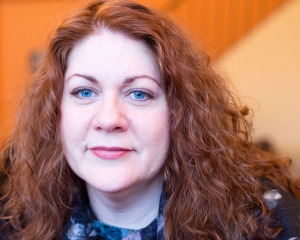Jeffrey Ricker's Blog, page 32
July 7, 2014
One for the road
You’re reading this at my WordPress blog, but before today, it was more likely you’d be reading this over on my other blog, which for the past few years I’ve kept at redroom.com, a social media site devoted to writers, writing, and readers. I came to know about it because my friend Huntington was an editor there, and I quickly grew to like how focused it was. I joined in 2007 (I think; maybe 2008?) and posted sporadically at first. After a while, I started making regular posts and linked to them from here, and eventually cross-posted everything between the two blogs.
Of course, it’s the people who make a place, and in addition to Huntington there was Ivory Madison, the head honcho who also wrote a really kick-ass Huntress graphic novel. There were other users of the site like Rosy Cole and Dr. Harrison Solow, who always had interesting things to say and stories to share; as well as recent acquaintances like Barbara Froman. And, of course, my friend and cohort and partner in (literary) crime, ’Nathan.
But, as ’Nathan put it, all good things. Red Room has merged with Wattpad, and as of today the site has sailed into the sunset. Everything posted on Red Room is replicated on this blog (well, at least my blog posts), but you can find a complete archive of the entire Red Room site here. Meanwhile, you’ll find many of the people from there on Wattpad, along with folks like the stellar Margaret Atwood. I already have a profile there, which is where you’ll find my short story “The Trouble with Billy,” which originally appeared in the anthology Speaking Out and was the first introduction to the characters in my latest novel, The Unwanted.
Thanks for everything, Red Room. See you over on Wattpad. (Or, you know, right here. Because I’m here, you’re here, we’re here—but anyway….)


July 4, 2014
An interview with Juliann Rich
Over the past few months I’ve gotten to know Juliann Rich via Twitter and her blog, as well as her debut novel, Caught in the Crossfire. It’s a story that is often heard but not told in the way Juliann has done—which is no doubt why it’s had such a strong reception. I wanted to ask her more about it, so we exchanged some questions via email:
Congratulations on the publication of Caught in the Crossfire! How has the reception been for the book so far?
Thank you! I really couldn’t have asked for a better reception! The overwhelming response from readers has been one of incredible appreciation for the book. I’ve had emails and direct messages thanking me for writing it and many have even said they wished it had been available when they came out. I love hearing things like that!
You’ve mentioned that you can appreciate both sides of this story because of your own family history and your background with faith. Can you tell me a little more about that and how the idea for this novel came about?
Sure! I grew up in a very conservative, evangelical Christian home. My grandparents were missionaries, my uncles were ministers, my parents were not only deeply involved with the church, but wonderful role models for what it means to have a personal relationship with Christ.
My own faith journey has always been more of a struggle. I am someone who questions, who examines, who must choose for myself, and frankly, I saw inconsistencies in the Christian church between what is preached (love your neighbor) and what is too frequently acted out (I’ll love the neighbors that are like me). But I never could shake my core belief in Jesus and His message. Time and again, I returned to the faith community for fellowship only to get frustrated and walk away.
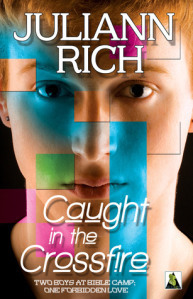 About ten years ago my son shared with me that he is gay. As you can imagine, this revelation brought all those issues of concern to the surface for my family, and we struggled. Man, did we struggle. Though my husband and I accepted him immediately, my extended family worried that affirming my son put his salvation at risk and the next seven years were marked by painful discussions. I wrote Caught in the Crossfire as an attempt to give my mother the opportunity to see through the eyes of my protagonist, a Christian teen struggling to accept his sexuality. In a sense, I was gambling on her good heart and ability to empathize, and I won. My mom read my book and called to tell me that she loved it. She also wanted to talk to my son. And this time, she wanted to listen to him.
About ten years ago my son shared with me that he is gay. As you can imagine, this revelation brought all those issues of concern to the surface for my family, and we struggled. Man, did we struggle. Though my husband and I accepted him immediately, my extended family worried that affirming my son put his salvation at risk and the next seven years were marked by painful discussions. I wrote Caught in the Crossfire as an attempt to give my mother the opportunity to see through the eyes of my protagonist, a Christian teen struggling to accept his sexuality. In a sense, I was gambling on her good heart and ability to empathize, and I won. My mom read my book and called to tell me that she loved it. She also wanted to talk to my son. And this time, she wanted to listen to him.
At that point, I felt that I’d achieved the highest success any writer can strive toward and anything beyond that would be icing on the proverbial launch party cake. In the two years that have followed—as Caught in the Crossfire found an agent, then a publisher, and then its readership—my mother and I talked about everything: sexuality, spirituality, what God’s promise of unconditional love really means. And these conversations have allowed us to know each other better as people and love one another more deeply than ever before. Though we still hold some different views, we’ve created a common ground that is based on the belief that we all deserve to be accepted and affirmed.
One of the things I really enjoyed about the novel was that it takes a common conflict—religion and sexual orientation—and resists strict “us vs. them” or “if you’re gay, you can’t be religious” resolutions. I’m assuming that was a deliberate choice on your part.
Yes, it was, but only because I determined to write as honestly as I could about the Christian community as I know it to be. Sure, we’ve got some loudmouths with megaphones. They get attention because they make great headlines, but I really don’t think those people are representative of the majority of Christians. Nor do their views shed any real light on the true problem when it comes to healing the rift between the Christian church and the LGBTQIA community.
The problem isn’t picketing. It’s polite discrimination, the kind of pervasive message that says, “I love you. Just not what you do.” Therein is the problem because as long as we see an identity as an action, we’re going to be tempted to bring judgment to that action. This is where phrases like “love the sinner, hate the sin” or “pray the gay away” come from.
It would have been easy to vilify Christians based on the few high profile people who say outrageous and hateful things, but I wanted to write a book in which the majority of Christians could recognize themselves. I wanted them to hear words they’ve spoken and see actions they’ve taken. And then I wanted them to see the impact of harm to the LGBTQIA kids who are growing up in their homes and churches.
I firmly believe that if the Christian community can see that wound, they will move toward affirmative love, which is what we are truly called to express as followers of Christ.
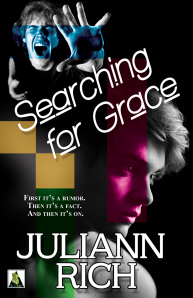 It’s interesting how different Jonathan and Ian are from one another. Jonathan is very optimistic and hopeful, and Ian is all sharp corners and internal (and external!) rage. Those stark differences make for a lot of conflict between the two of them. Was it hard to bring the two characters together given that they come from almost completely opposite directions?
It’s interesting how different Jonathan and Ian are from one another. Jonathan is very optimistic and hopeful, and Ian is all sharp corners and internal (and external!) rage. Those stark differences make for a lot of conflict between the two of them. Was it hard to bring the two characters together given that they come from almost completely opposite directions?
This is such a great question, and it gives me an opportunity to talk about something many readers might not realize: Jonathan and Ian are actually very similar. I even chose names that have the same meaning, “God’s gift.” In fact, the name “Ian” is derived from “Jonathan.”
In short, Ian is the person Jonathan could easily become if his core need is not met, which is to accept himself and be accepted in his true identity by his family. He is also the person Jonathan could become if the wounding goes too deep and Jonathan loses his faith altogether. Ian is his own person to be certain, but he is also the spotlight trained on the darkest possible future for Jonathan.
This was not hard to write at all. I just had to think about what would happen to Jonathan if the worst occurred, and then write that as Ian’s backstory and allow it to flavor his entire worldview.
I hadn’t thought of it that way, but it does make sense. Caught in the Crossfire is the first in a three-book series, right? What happens in the next two books?
Hmm, I’m not going to give away major plot points, but I will say this: The next book, Searching for Grace, deals with the reality that sets in once Jonathan leaves the bubble of Bible camp. It’s one thing to embrace an identity when you’re away from home, your parents, and your day-to-day friends. But what happens when you need to integrate that new identity into your real life? That conflict is the core of Searching for Grace. The last book, Taking the Stand, is about overcoming the difficulties that Jonathan encounters in Searching for Grace. It’s literally and figuratively about standing up to them and finding the strength to claim his place and identity in his world.
You’re a PFLAG mom—has your son read the book? Have any of your other family members read it? What sort of conversations has that inspired?
My son has read Caught in the Crossfire and loves it, though he actually enjoys the sequel, Searching for Grace, more because it is a story he can relate to with greater ease. My son never struggled with integrating his sexuality and his spirituality. He ran into the hard wall of judgment within the Christian church and walked away. He has not looked back. But trying to maintain his truth against the resistance of family members and friends? That he can relate to.
Some other family members have read my book and some have not, but those who have read it are all curious. Where do I get my ideas? (EVERYWHERE!) Is anyone in the book based on them? (NO!) Is it hard to write a book? (YES!)
They’ve enjoyed the story, but also the glimpse into the world of my imagination. I’m the only writer in my family so what I do is a bit of a mystery to them.
And then, of course, there are all the deep conversations we have had as a result of my book that I discussed in my answer to question # 2.
There’s also a strong sense of place in your writing, from the Bible camp Jonathan and Ian attend to the natural environment surrounding them. It’s clearly a setting that you know well. Was there anything about it that surprised you when you sat down to write about it?
I spent my summers as a kid going to Bible camp and/or the Native American reservation in Wisconsin where my uncle was a minister. I drew from both locations for Caught in the Crossfire. My favorite place, hands down, is Minnesota’s North Shore. So it was no surprise to me or anyone else that I chose to set Spirit Lake Bible Camp there.
However, I did learn something about myself when it was time to write Searching for Grace, which I set in a fictional high school in the Twin Cities. I discovered that I sorta stink when it comes to writing setting! Yeah, I kinda hate having to take a break from dialogue to describe something! In Caught in the Crossfire I got to luxuriate in a lush forest and swim in a lake so writing setting was fun and brought me to places I love. But a high school boys’ locker room? Not so much.
Here’s what I learned (and yes, it was a surprise): Dialogue is the pedal to the metal that keeps the story moving. Setting anchors the reader to the world and awakens the senses. A great book (and a great writer) provides readers with a balance, and I need to make a concerted effort to write both, even the passages I’d rather skip.
Writing is not your only job. You also work in marketing and PR. When did you realize you wanted to be a writer?
Since I was a kid! Seriously. Written communication has always been the go to tool in my toolbox, but I’ve used it to promote others for most of my adult life. This was safer, I think, than stepping into the foreground and writing words that reflect my truths.
I think I instinctively knew that anything I cared enough about to spend years expressing would also be something that would shake the foundations of my life and of the lives of people I love. That’s scary stuff. But ultimately, the pain of not writing my stories was bigger than the fear, and I stepped into my life’s path.
What do you think you’ll write after this trilogy?
My next book is another young adult/new adult book, but it’s very different from The Crossfire Trilogy.
First, it’s not a coming out story. While coming out stories are great, they are not the only valid story in young adult LGBTQIA literature! So I’m writing a book where my protagonist’s sexual orientation and gender identity are not the source of conflict.
And second, I’m writing a story with paranormal elements! I decided to do this after I wrote a speculative fiction short story for BSB’s Queer Fairy Tales anthology and had a blast! I can’t wait to bring what I learned from that experienced into the form of long fiction.
I’ll save some of the more juicy details about the book for when it’s ready to be introduced to the world, but I’ll tell you this: it’s a paranormal murder mystery with a gender fluid protagonist.
I’m intrigued already—and there are a few parallels between that and something I’m working on (but more on that later).
One of the things I tend to do when I visit someone’s house is look first and foremost at their bookshelves. What would I find on yours?
First and foremost, you’ll probably find dust since I’m working around the clock right now to promote Caught in the Crossfire, edit Searching for Grace, and draft Taking the Stand! But beneath the dust, you’ll find my heroes: James Baldwin, Maya Angelou, John Green, Laurie Halse Anderson, Radclyffe, Pete Hautman, Alex Sanchez, David Levithan, Neil Gaiman, Steve Brezenoff, Swati Avasthi, Kirstin Cronn-Mills, Rachel Gold, Molly Beth Griffin, and too many others to name here. I fill my home and my mind with authors who are willing to challenge the world to be a more compassionate place for all people.
Moving from the bookshelf to the nightstand, what are you reading at the moment?
I am re-reading one of my all time favorite novels: Silhouette of a Sparrow by Molly Beth Griffin. It’s a beautiful affirmative young adult novel set in Minnesota in 1920. It is an amazing book that both awakens and soothes my mind, and I return to it often.
Did you ever find that perfect climbing tree you were looking for during your childhood?
Yes, and it was in my own backyard all along.
Thanks, Juliann! Here’s where to find out more about her and her writing:
Website: www.juliannrich.com
Blog: www.therainbowtreeblog.com
Facebook: https://www.facebook.com/pages/Juliann-Rich/198579460259167?ref=hl
Twitter: https://twitter.com/JuliannRich1
Email: juliannrichbooks@gmail.com
Where to find her books:
ORDER CAUGHT IN THE CROSSFIRE:
IndieBound | Amazon | Barnes & Noble | Bold Strokes Books | WorldCat
PRE-ORDER SEARCHING FOR GRACE:
IndieBound | Amazon | Barnes & Noble | Bold Strokes Books | WorldCat


June 30, 2014
#BookADayUK 30: Waking up with the house on fire
Yes, the headline’s slightly different from the actual wording of today’s #BookADayUK prompt, which is “would save if my house burned down”.
And by the way, the period at the end of that last sentence has vexed me for a while. Now, in Associated Press style, it would typically go inside the quotation marks. I believe it would also go inside the quotes in Chicago style, but my manual is upstairs and I’m at the dining room table and am disinclined to leave my cup of coffee. Since studying in Canada, though, I’ve noticed a preponderance of periods and commas hanging out outside the quotes. Is that a particularly British or Canadian thing?
For now, I’m content to live with the mystery unless someone reading out there can supply the answer. (Translation: I’m lazy and can’t be bothered to get up right now.)
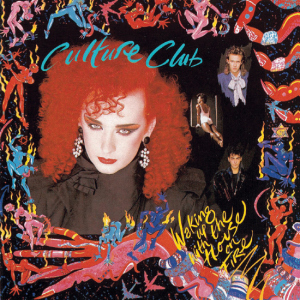 But anyway, today’s prompt is the last one for the #BookADayUK list, and once again I’m departing from script, in addition to the reworded prompt/Culture Club reference. (You all got that reference without my having to tell you, right?) If the house is on fire, there are a few things I’m saving, and books are not among them. I’m grabbing the dog, the partner, maybe some family photos, but I’m focusing on getting the hell out. I don’t even need to grab my laptop; all of my working files are backed up to cloud storage. Everything else can be replaced.
But anyway, today’s prompt is the last one for the #BookADayUK list, and once again I’m departing from script, in addition to the reworded prompt/Culture Club reference. (You all got that reference without my having to tell you, right?) If the house is on fire, there are a few things I’m saving, and books are not among them. I’m grabbing the dog, the partner, maybe some family photos, but I’m focusing on getting the hell out. I don’t even need to grab my laptop; all of my working files are backed up to cloud storage. Everything else can be replaced.
If I were to grab any books before the whole place went up in flames, honestly, I’d grab the library books. They don’t belong to me, so they have to be returned. Also, they’re on the dining room table close to the front door, so I could pick them up at the same time as the dog.
And that’s it from me for #BookADayUK. This has been fun. Tomorrow starts July, and I’ll probably be back to form with sporadic updates and frequent snark!
(Anyone else have “The War Song” running through their head now?)


June 29, 2014
#BookADayUK 29: The one I have reread most often
One of the things I didn’t want to do when I started writing on the #BookADayUK prompts was repeat myself. I figured I’d talk about thirty different books over the course of thirty days. I didn’t think that would be hard, as there are some years I’ve read more books than that.
Today though, I’m going to repeat myself, and you probably already know what the answer to this question is. Which book have I reread the most often? That would be F. Scott Fitzgerald’s The Great Gatsby. It’s the book I chose for day 6 as the one I always give as a gift—or at least the one I’ve given most often.
Something’s come to my attention, though, and I don’t know how this slipped my notice before now: I don’t actually have a copy of The Great Gatsby at the moment.
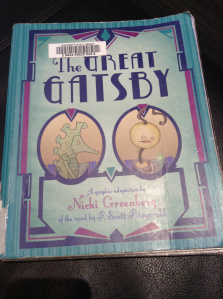 I’m not sure whom I gave my last copy to. I think it might have been someone at work, and I probably gave my usual stunned reaction when they said they hadn’t read it. For some reason though, I don’t seem to have replaced my copy this last time.
I’m not sure whom I gave my last copy to. I think it might have been someone at work, and I probably gave my usual stunned reaction when they said they hadn’t read it. For some reason though, I don’t seem to have replaced my copy this last time.
To make this post about Gatsby a little different from my earlier one, I wanted to point out an edition I found in the library back at UBC that was unexpected. It’s a graphic novel adaptation of The Great Gatsby, and all of the characters are drawn quite fancifully:
Nicki Greenberg, with her bold illustrative style, retells F. Scott Fitzgerald’s classic The Great Gatsby in a brilliant, innovative graphic novel. In the exquisitely realized setting of 1920s New York, a throng of fantastical creatures play out the drama, the wry humour, and the tragedy of the novel. Nicki Greenberg is reverently faithful to the plot, mood, and characterization of the original and brings to life the glitter, the melancholy, and the grand and crumpled dreams of Fitzgerald’s unforgettable characters. (from Goodreads)
I’ve never been a big fan of Gatsby adaptations. I wasn’t quite convinced by the Robert Redford version in 1974 (although Mia Farrow as Daisy seemed perfect), and I haven’t been able to bring myself to see the Baz Luhrmann version. I’ve been told that’s for the best. What’s impressive to me about this graphic novel is that I quickly forgot that the characters as Greenberg drew them were not human. And yet Gatsby seems to work perfectly well as a seahorse.
And that’s not a sentence I would ever have expected to write.


June 28, 2014
#BookADayUK 28: Bought at my favourite independent bookshop
Wow, the month of June is almost over, which means I’ve been back in St. Louis almost a month, I’ve been finished with grad school for more than a month, I’ve been “funemployed!” (my friend Emma’s term, which I love) for that long as well, and we’ve only got a couple more #BookADayUK posts to go. This has been fun; I love to talk about books, though perhaps not as much as I enjoy reading (and writing) them. And it’s also been a good encouragement for me to write more frequently on the blog, which hopefully has been enjoyable for you to read. And I hope maybe you’ve added a couple titles to your to-read list as a result.
Pretty much every book I own was bought at an indie bookstore. That even goes for e-books, which I’ve been able to get from Kobo via my reliable local’s website. I did get a Barnes & Noble gift card for graduation, so I’ve been using that to buy some e-books, but most of the time, I choose to get books from my local indie, such as Left Bank Books. (If it seems like I mention them a lot, it’s because I love their store.)
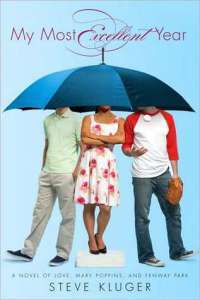 So the range of books I could highlight for this #BookADayUK prompt is broad, to say the least. What I’m going to do, though, is choose the latest one I picked up, when I stopped by the shop a week or so ago, and that’s My Most Excellent Year by Steve Kluger:
So the range of books I could highlight for this #BookADayUK prompt is broad, to say the least. What I’m going to do, though, is choose the latest one I picked up, when I stopped by the shop a week or so ago, and that’s My Most Excellent Year by Steve Kluger:
Best friends and unofficial brothers since they were six, ninth-graders T.C. and Augie have got the world figured out. But that all changes when both friends fall in love for the first time. Enter Ale. She’s pretty, sassy, and on her way to Harvard. T.C. falls hard, but Al‚ is playing hard to get. Meanwhile, Augie realizes that he’s got a crush on a boy. It’s not so clear to him, but to his family and friends, it’s totally obvious! Told in alternating perspectives, this is the hilarious and touching story of their most excellent year, where these three friends discover love, themselves, and how a little magic and Mary Poppins can go a long way. (from Goodreads)
I couldn’t tell you quite why I picked this one up. This is my first encounter with Steve Kluger, so I wasn’t familiar with him before seeing this book on one of the tables in the store. It might have been the name “Mary Poppins” in the subhead. I was a huge Mary Poppins fan when I was a little kid, to the point where I kind of wanted to be her. (Yes, that aspiration predates my desire to be Wonder Woman. Lord, my parents must have known….)
So, yes, total impulse buy. I’m looking forward to reading it.
Oh, and the other thing the end of June means? It’s Pride in St. Louis this weekend. Everyone have fun!


June 27, 2014
BookADayUK 27: Want to be one of the characters
Again, for today’s #BookADayUK prompt I’m blatantly stealing from ’Nathan Burgoine.
Actually, the topic of theft is completely appropriate in this instance, given that in his post for today, he mentioned wanting to be a character in the world of Rob Byrnes’s gang that can’t do anything straight. This group of ne’er-do-wells, led by Chase LaMarca and Grant Lambert, consists of thieves, swindlers, scam artists, grifters, cheats, and liars. They’re the most loveable bunch of good-for-nothings you could ever hope to meet.
Just don’t get on their bad side.
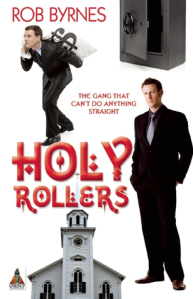 The gang made their first appearance in the book Straight Lies, which ’Nathan talked about in his post. Earlier, I talked about the third book in the series, Strange Bedfellows. So let’s take a look at the middle instalment, Holy Rollers:
The gang made their first appearance in the book Straight Lies, which ’Nathan talked about in his post. Earlier, I talked about the third book in the series, Strange Bedfellows. So let’s take a look at the middle instalment, Holy Rollers:
When Grant Lambert and Chase LaMarca—partners in life and crime—learn that $7 million in not-so-petty cash is hidden in the safe of a rightwing mega-church, they assemble a team of gay and lesbian criminals to infiltrate the church and steal the money. But this Gang That Can’t Do Anything Straight quickly finds its plans complicated by corrupt congressmen (and their gay aides); an “ex-gay” conference; an FBI investigation; the unexpected appearance of a long-lost relative; and—most jarring for these born-and-bred New Yorkers—life in the northern Virginia suburbs. And then there is Dr. Oscar Hurley—founder of the church—and his right-hand man, the Rev. Dennis Merribaugh, who prove themselves every bit as adept as the professionals when it comes to larceny… (from Goodreads)
I would make a valuable addition to Grant and Chase’s band of sorta-villains, I’m sure. I can be vicious, I have a background in graphic design, which gives me access to an ample supply of cropping tools, and I have anger management issues.
I mean, come on, how could they not want me on the team?


June 26, 2014
#BookADayUK 26: Should have sold more copies
Well, my book. Duh.
But seriously, I figure I should take today’s #BookADayUK prompt as an opportunity to tout a book I read and loved but that didn’t seem to get as much love as it could have (or should have). Of course, getting book sales data is not my bailiwick. I might as well look into a crystal ball.
So, here’s what I decided to do.
As you know, if you’ve followed any of the links I’ve included in these #BookADayUK posts, I use Goodreads to keep track of what I’ve read over the past few years. (You can see the shelf of books I’ve read here.) I looked at my most recent reads and noted the number of ratings and reviews they’ve gotten. (By the way, I typically advise taking the ratings/reviews given there with a margarita-sized dose of salt. Whew, the snark! And I’m not even talking about reviews of my own stuff, which have been largely positive or at least benign.) Out of those, I found two that haven’t received very many reviews, and they’re both books (in the case of one, a novella) that I absolutely loved.
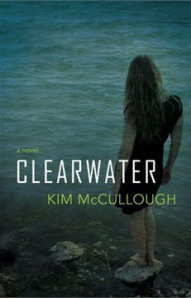 I should start with a caveat that I know Kim McCullough. We’re both graduates of the University of British Columbia’s MFA in creative writing program. I picked up Clearwater when I got word in the fall of my second year that it had been published. With the push to get my thesis done (along with edits on my second novel), I didn’t make time to read it until I was back in St. Louis.
I should start with a caveat that I know Kim McCullough. We’re both graduates of the University of British Columbia’s MFA in creative writing program. I picked up Clearwater when I got word in the fall of my second year that it had been published. With the push to get my thesis done (along with edits on my second novel), I didn’t make time to read it until I was back in St. Louis.
And what a great book it is.
Claire Sullivan quickly settles in to her new home at Clearwater Lake in northern Manitoba, especially once she befriends Jeff Carson, a quiet mixed-race loner who lives with his parents in the other half of the Sullivans’ duplex. Together, the teens roam the wild, isolated beauty of the nearby lakeshore and forest, forging a deep friendship based on loyalty and trust.
As peaceful as things seem on the surface, Claire and Jeff are both battling powerful undercurrents at home. Claire worries that her sister, Leah, who has been sexually assaulted, is sinking into a drug-fuelled depression, while Jeff finds it difficult to stand firm in the face of his father’s increasingly brutal temper. (from Goodreads)
Giller-winning author Joseph Boyden had this to say about McCullough’s writing: “Kim McCullough writes with such clarity and grace that the reader doesn’t so much enter these at once familiar and yet foreign worlds, as slips into them. McCullough’s an emerging writer Canadians should be keeping an eye on.” Canadians and anyone interested in engaging, beautifully written fiction.
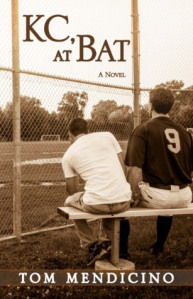 Tom Mendicino is another writer I know. I read his debut novel Probation before I met him at the Saints & Sinners Literary Festival—there are times it seems like all my roads begin and end in New Orleans, and that’s not a bad thing. I loved Probation, and when I heard that Tom had a novella coming out as an e-book from Kensington, I really looked forward to it:
Tom Mendicino is another writer I know. I read his debut novel Probation before I met him at the Saints & Sinners Literary Festival—there are times it seems like all my roads begin and end in New Orleans, and that’s not a bad thing. I loved Probation, and when I heard that Tom had a novella coming out as an e-book from Kensington, I really looked forward to it:
Charlie Beresford would rather be doing anything this summer than hauling furniture for a moving company. Come September, he’ll be leaving for college, away from the awkwardness of Augustinian Academy, away from his father’s constant hints about prospective girlfriends. Then Kevin Conroy—the Mighty KC—joins the moving crew. A star baseball player bound for the big leagues, Charlie is shocked when cool, confident KC suggests hanging out, especially when KC asks him to stay over—and the happiness their connection brings Charlie.
But the summer is changing Charlie—putting muscles on his skinny frame, compelling him to face hard truths, showing him how it feels not just to lose your heart but to break someone else’s. Funny, sweet, and moving, Tom Mendicino’s insightful coming-of-age story perfectly evokes that moment when you stop living life from the safety of the bleachers—and finally step up to home plate.
I devoured this in one sitting. I love Tom’s writing style, his characterizations, and the sense of longing this story evokes. Part two of the story, Travelin’ Man, is coming soon. I’ll be ordering it.


June 25, 2014
#BookADayUK 25: Never finished it
Again, I’m going to deviate a little from today’s #BookADayUK prompt. This one’s a bit negative, isn’t it? Usually, I prefer not to talk about books I don’t like. Call it concern for my own karma or just the fact that there’s more than enough negativity in the world. That’s not to say it’s wrong not to like something. Because it’s not! There are tons of things I don’t like: humidity, excessive heat, almonds, dry ice, reviewers who forget Wheaton’s Law—I mean, I could go on and on.
But I won’t.
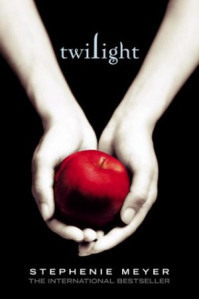 Anyway, it occurs to me that I could write about a book that I didn’t finish—Twilight by Stephenie Meyer, which I started reading while on a Christmas visit to my brother’s house. It was my niece’s copy (she loves the Twilight series, though I’m not sure if she’s Team Edward or Team—it’s Jacob, right?). Anyway, I’d finished reading the books I’d already brought, and since I’d had occasion to giggle about sparkly vampires in the past (and please, no bashing of sparkly vampires in the comments; I won’t post them) without having read the book, I thought, to be fair, I should give it a go.
Anyway, it occurs to me that I could write about a book that I didn’t finish—Twilight by Stephenie Meyer, which I started reading while on a Christmas visit to my brother’s house. It was my niece’s copy (she loves the Twilight series, though I’m not sure if she’s Team Edward or Team—it’s Jacob, right?). Anyway, I’d finished reading the books I’d already brought, and since I’d had occasion to giggle about sparkly vampires in the past (and please, no bashing of sparkly vampires in the comments; I won’t post them) without having read the book, I thought, to be fair, I should give it a go.
When Bella Swan moves to the gloomy town of Forks and meets Edward Cullen, her life takes a thrilling and terrifying turn. With his porcelain skin, golden eyes, mesmerizing voice, and supernatural gifts, Edward is both irresistible and impenetrable. Up until now, he has managed to keep his true identity hidden, but Bella is determined to uncover his dark secret.
What Bella doesn’t realize is the closer she gets to him, the more she is putting herself and those around her at risk. And it might be too late to turn back… (from Goodreads)
I got to around page 250, I think, before we were due to leave, so that’s where I left it. It wasn’t bad, but I wasn’t the reader for it. I would have preferred a faster pace and a protagonist with more agency, but it was competently written and I don’t think Mrs. Meyer is lacking for my not reading them. Good on her; I’d much rather see someone gain success through writing than through the petrochemical industry.
That’s the thing, though; the book wasn’t for me, and I wasn’t for the book, so I was fine with not finishing it.
But.
There is one book that I did finish that I wish I never had. I’m not going to even link to it here, because I loathe it that much:
I wish I’d never finished Ayn Rand’s The Fountainhead.
Unlike Joyce’s A Portrait of the Artist, this one did deserve to be thrown with great force. When I finished it, I don’t think I even turned it in at the used bookstore. I think I recycled it. The story was hamhanded, the writing clunky, and the philosophies it supported about as sophisticated as what a five-year-old would come up with. No wonder it’s beloved by Tea Party faithful.
And the only reason I feel comfortable saying any of that is because Ayn Rand is dead. Which puts me in mind of what Bette Davis said about Joan Crawford, but I’m not going to repeat that here. (Although I did wind up reading an entire page online of Bette Davis bon mots and boy was she quotable. My favourite might be “Getting old is not for sissies.”)


June 24, 2014
#BookADayUK 24: Hooked me into reading
Wow, that was a long time ago. For most of these #BookADayUK prompts, I’ve had to jog my memory by going upstairs and perusing the bookshelves to see if anything came to mind. This one goes back far enough that whatever book it was that really got me hooked on reading, it’s no doubt passed out of my possession.
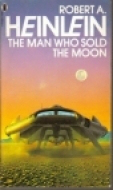 To my surprise, though, it only took a little while to bring back to mind The Man Who Sold the Moon. After that, though, my memory failed me. I can’t recall any details about the title novella in this collection or any of the other stories. I just remember that I was a big science fiction fan as a kid (and remain one today), but exclusively of the movies and TV variety. Then my mom handed me this book, I think. Robert Heinlein and Isaac Asimov were the first science fiction writers I read. I started with their short stories, then moved on to Asimov’s Foundation series and assorted Heinlein novels, which grew increasingly, well, bizarre the further I read. But the short stories stoked my imagination, and got me thinking “what if”:
To my surprise, though, it only took a little while to bring back to mind The Man Who Sold the Moon. After that, though, my memory failed me. I can’t recall any details about the title novella in this collection or any of the other stories. I just remember that I was a big science fiction fan as a kid (and remain one today), but exclusively of the movies and TV variety. Then my mom handed me this book, I think. Robert Heinlein and Isaac Asimov were the first science fiction writers I read. I started with their short stories, then moved on to Asimov’s Foundation series and assorted Heinlein novels, which grew increasingly, well, bizarre the further I read. But the short stories stoked my imagination, and got me thinking “what if”:
D.D. Harriman is a billionaire with a dream: the dream of Space for All Mankind. The method? Anything that works. Maybe, in fact, Harriman goes too far. But he will give us the stars…. (from Goodreads)


June 23, 2014
#BookADayUK 23: Made to read at school
 I’m not proud of what I did to A Portrait of the Artist as a Young Man.
I’m not proud of what I did to A Portrait of the Artist as a Young Man.
I was seventeen at the time I was made to read it for honours English in high school. Grade 11, I think. Maybe I was sixteen. I loathed that book. Reading it felt like a misery, like penance, and I wasn’t even Catholic.
When I was done with it, slim volume that it was, I flung the paperback across the room. At that age I hadn’t yet heard the Dorothy Parker quote, “This is not a novel to be tossed aside lightly. It should be thrown with great force,” but I would have imagined she’d had James Joyce in mind when she said that.
I don’t know what possessed me to pick it up again years later. I was either in my late twenties of early thirties when I came across it again on the bookshelf. I hadn’t thought about that book in years, but in the meantime I’d read an article about how books offer us different versions of themselves when we encounter them at different points in our lives. So I gave it another shot, and it was such a better experience.
A Portrait of the Artist as a Young Man represents the transitional stage between the realism of Joyce’s Dubliners and the symbolism of Ulysses, and is essential to the understanding of the later work.
The novel is a highly autobiographical account of the adolescence and youth of Stephen Dedalus, who reappears in Ulysses, and who comes to realize that before he can become a true artist, he must rid himself of the stultifying effects of the religion, politics and essential bigotry of his background in late 19th century Ireland.
Written with a light touch, this is perhaps the most accessible of Joyce’s works.



